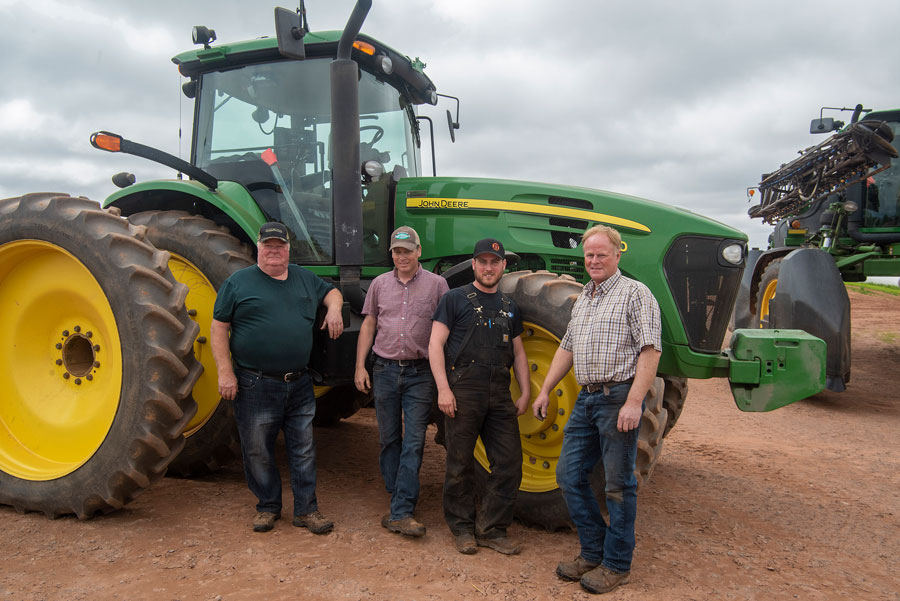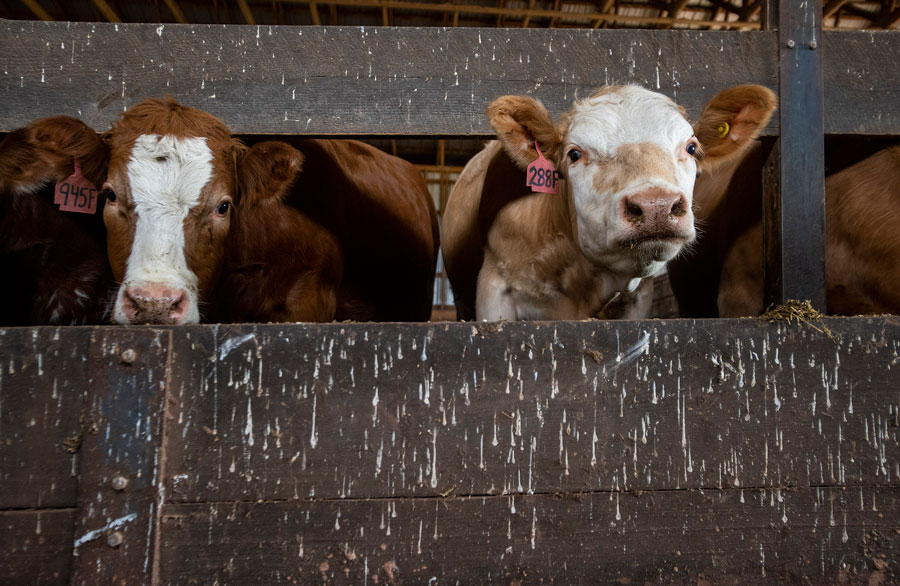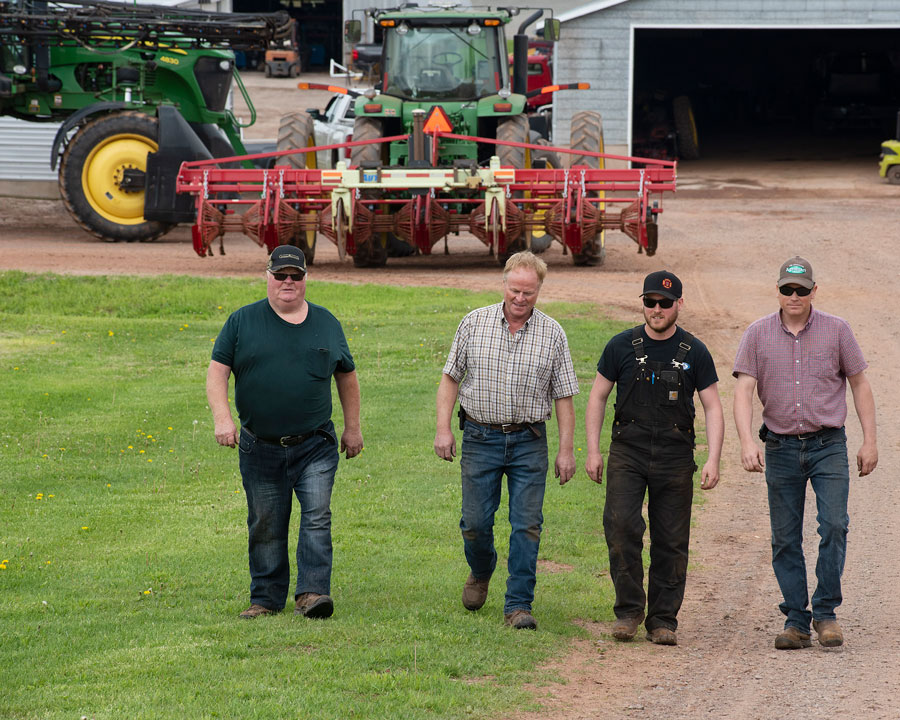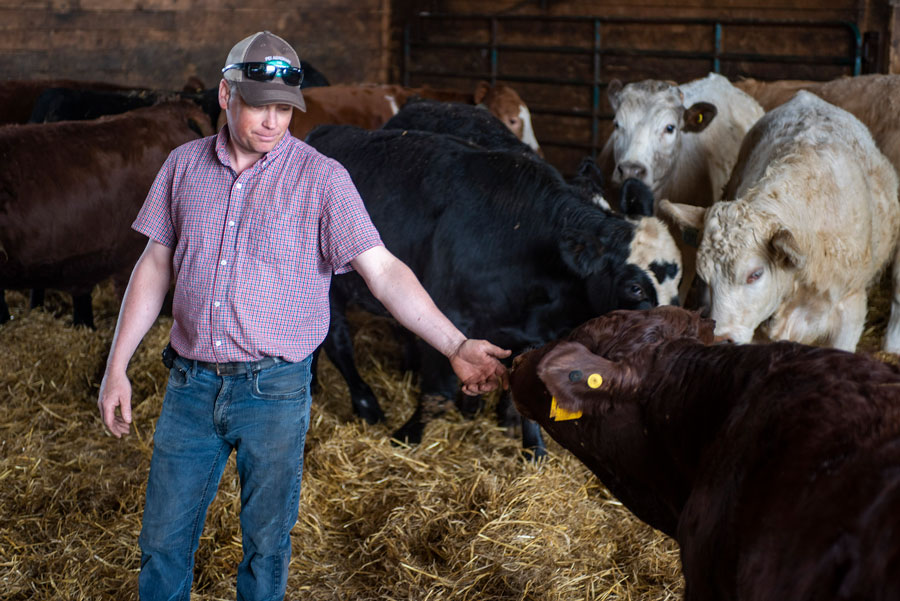Aiden McIver of Arthur Cousins and Sons is a familiar sight to the beef cattle being raised on this generational farm
It’s a cloudy and cool Saturday in early June when we make the trek to Spring Valley Rd, just north of Kensington and Indian River to visit Arthur Cousins and Sons’ farm. The spring planting of barley and alfalfa has just wound down, so there’s just a bit of breathing space to allow for our visit.
“We just finished, our crops are all in the ground”, Aiden McIver explains. “And we’re going to start harvesting next week ‘cause we start harvesting our hay crops…we finish planting and start harvesting.” The hay was underseeded with the barley last spring and is now ready to be harvested for silage.
McIver calls himself “just an employee”, but it’s definitely a family affair at Arthur Cousins and Sons. Like many on PEI, it’s a generational farm. Father Arthur began the farm in the late 1950s, sons Donald and Brian and grandson Darcy now carry on the farm business. McIver happens to be married into the business, as a son-in-law to Donald. Arthur passed away a few years ago.
It’s a tidy, yet sprawling farm, multiple barns everywhere the eye can see, and farm equipment neatly parked. The crops that were just planted will feed the 325 head of beef cattle that the farm raises. They’re down a bit in numbers this spring, as generally they have 400 head.
“We’re involved in the VB Plus program, which is verified beef production”, McIver says. “It’s kinda the food safety for the cows, it’s nationally recognized. We’ve been audited once, it’s a five-year audit we have to go through. A complete paper trail for injections, needles, we have to record everything, record our feed. It’s pretty strict but it’s worth it.”
That stringent record-keeping stems from the BSE (aka Mad Cow Disease) crisis in 2003 which resulted in over 40 countries closing its markets to Canadian beef. It’s how the beef industry ensures the cattle here on PEI and across Canada remain BSE-free. The last reported case of BSE in Canada was in 2015, in a cow that was born in 2009, so Canada will be eligible to change its status in another year. In late May, Japan announced that it would reopen its market to Canadian beef from cattle older than 30 months old, and this bodes well for the export of our beef and the continued rebuilding of the PEI beef industry.
Brian Cousins remarks that it’s a “full-time job” keeping up with all the paperwork involved with bringing cattle from the barns and fields to what ultimately ends up in stores for us to buy and eat.
Arthur Cousins and Sons were just the recipient of the Atlantic Beef Processing Inc’s (APBI) Quality Assurance Award. Russ Mallard, president of ABPI, explained that the award is “given to producers who provide the plant with beef that most consistently meets our grade and size requirements.”

“We’re getting a lot of triple ‘A’s [grade of beef]. 90-95 percent are probably triple ‘A’s,” McIver says with just a touch of pride.
The farm buys cattle when they are just under a year and roughly 600 pounds, and “finishes them up to 1600 pounds,” McIver explains. Although their cattle are not out on the pasture, they are fed twice daily with alfalfa, timothy, and barley and get fresh bedding each day as well. After they reach weight, they go to ABPI for processing.
Mallard and the ABPI team have worked hard to create industry knowledge about PEI beef and just how flavourful and high quality it is.
“The guys down at the beef plant are doing an excellent job of marketing our beef,” McIver says. “They’re getting good quality stuff and they’re doing a good job marketing it.”
Mallard attributes our Island beef’s quality to the farmers.
“We think a major factor is that our producers raise their beef the way beef used to be raised; small family farms, lots of grass and synthetic growth hormones are generally not used which means cattle from our area are usually around 6 months older than feedlot beef in other parts of the country when sent to market,” he said. “This extra time allows for more natural flavour to develop. We think the salt air and iron rich soils also helps to develop a unique ‘terroir’.”
Donald Cousins speaks highly of ABPI, “What caught my eye about this plant was the cleanliness of it. Everything is spic and span.” It’s important to him that his cattle are not only raised well, but have a good end to their lives, and ABPI provides that.
The fact their cattle are fed daily by hand allows them “to get used to people”. It’s easy to see that the cattle do know their owners (or at least the source of their food), as they come forward to meet the men as they walk by them.

Arthur Cousins didn’t start out as a beef farmer, raising first chickens, then pigs, and finally cattle. Donald laughs, “Dad never liked hens ‘cause you had to carry them. If you wanted to move them you had to carry them.” At one point the farm had 1200 head of cattle, a far cry from the current herd.
“Arthur really loved the cattle, that’s why they’re here,” McIver says.
The challenges of farming are not lost on the Cousins brothers, the farm also plants potatoes each year and have their fields in a three-year rotation with the forage crops. Last year’s horrid fall harvest affected them as well. “It was the year from hell,” Brian says, “from start to finish.”
Donald relates their final night trying to harvest the potatoes, “I can remember the last night we dug, I’ll never forget it. We got one truck stuck four times, we got the harvester stuck once, the six-row windrower stuck once. And digging around wet spots, pulling trucks…around three in the morning I said, “that’s it, we’re done, go home.”
Another issue that is not exclusive to them, but to all Island farmers, is the difficulty in finding labourers to work at the farm. “People don’t like work,” Donald says bluntly.
“Most of our workforce is 60 and up,” Brian says of the current demographic make-up of most farms. The brothers relate a few stories of hiring younger labourers, only to have them get up and leave when the job gets a little tougher than expected. “You almost have to hire extra just to allow for those that just get up and leave,” he says.
Having a lack of labourers means that there becomes more reliance on machinery that can do more. And as efficient as that can be, it also means more debt. A recent census revealed that Island farms carried over $822 million in debt. It’s not hard to see why, as most large farm equipment can run into the hundreds of thousands to purchase.
“It’s a big gamble,” Donald says. “You’re putting millions of dollars worth [of crops] in the ground. You don’t know what you’re going to get, you don’t know what the weather’s going to be. That’s the biggest challenge.”

When asked how the farm is mitigating the risks, the brothers point to having a diverse farm, with cattle, potatoes, and growing their own silage for their herd. They participate in the Alternate Land Use Services program, planting trees, and creating berms to mitigate soil erosion. A number of years ago the farm was awarded the Soil Conservationist of the Year from PEI Soil and Crop Improvement. As they have cattle, they also have manure that can be used to fertilize their fields, and Donald remarks that they’re optimistic and determined that Arthur Cousins and Sons will continue to operate for generations to come. Donald says, “My father, it was a lifetime to him, doing this…wasn’t a thing here. He worked in a mattress plant in Toronto. His father called him and said ‘listen, there’s a farm for sale right next to us here. Are you interested?’ So he came home, he bought it and he had some tough sledding.”
Farming is tough sledding indeed, but plowing ahead through it all is in the Cousins’ genes, and that bodes well for them as a farm.
- WTF - December 2, 2020
- WHAT GOES AROUND COMES AROUND - June 12, 2020
- Salty’s 2020 Gift Guide - December 2, 2020
- A RETURN OF DELIVERY - May 6, 2020
- ICYMI - April 22, 2020
- NEW BIOMASS BOILERS FOR LOCAL GREENHOUSE - March 31, 2020
- TOP CHEF CANADA COMPETITOR FROM PEI - March 4, 2020
- FOOD INSECURE - March 1, 2020
- ACCESS TO FRESH PRODUCE - March 1, 2020
- POLITICS OF SCHOOL FOOD - March 1, 2020


